Search results for "harjunpää/2010/10/mikko-rimminen-nenapaiva-nose-day"
Journey to the first palm tree
16 October 2014 | Fiction, Prose
Teemu is a fat, desperate middle-aged man who’s had it with life – he drives his old Lada to Spain, where he intends to commit suicide by letting himself be trampled to death by bulls in the Pamplona bullrun. (However, there is a chance of this tragedy being cancelled, thanks to a tenacious hitch-hiker, female.) An extract from the novel Särkyvää (‘Fragile’, Tammi, 2014)
When I was seventeen, I yearned to leave behind the small town where I grew up. I heard the owl hooting in the forest: go to Europe.
I heard the dirt-track gravel crunching beneath my shoes: run, lad, run.
The birch in the yard rustled and whispered: if you spend one more summer hanging around the garden of your childhood, you’ll stay here forever.
A frog in the ditch gave a stern croak: look at your father; if you don’t escape you’ll end up an old codger just like him.
Even the smoke twirling up from the sauna chimney spoke to me in billows: I’ll show you the right direction, head south, and don’t stop until you see the first camel. More…
Books and roses
23 April 2013 | In the news
 The tradition of the international Day of the Book and the Rose derives from 1920s Barcelona, where the tradition was for men to give women roses while women gave men books.
The tradition of the international Day of the Book and the Rose derives from 1920s Barcelona, where the tradition was for men to give women roses while women gave men books.
23 April is the day – and it is (possibly) also Shakespeare’s birthday. In 1995 UNESCO proclaimed it is the World Book and Copyright Day.
(Actually, we’ve always thought the idea of what is exchanged is rather silly. As women, we would much rather be given a a book than a withering cut flower. On the other hand though, a rose is a safe bet….)
Last year, the Finnish booksellers decided to celebrate the occasion by publishing a new novel which was given for free to all customers who made a purchase worth €10. This was the only way to get hold of a copy; the print run was 3,000 copies. The author was Tuomas Kyrö, the novel, Miniä (‘Daughter-in-law’).
This year the print run is more than tenfold, and the author is Jari Tervo. His novel Jarrusukka (‘Slipper sock’) tells the story of a teacher, working in an immigrant neighbourhood, who finds out it’s not possible to lease a baby in a short term.
All my loving
15 February 2013 | This 'n' that
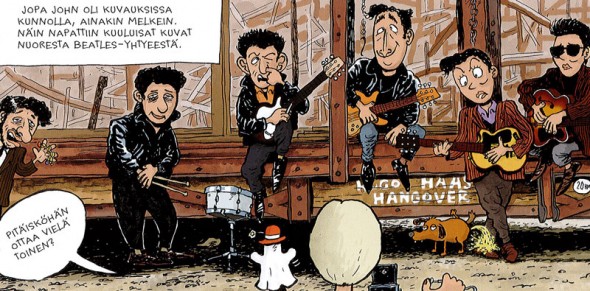
(Early days in Hamburg) Even John behaved himself in the photo sessions, at least almost. This is how the famous photos of the young Beatles were taken.
–Should I take one more? (Astrid the photographer)
One day in the antediluvian times of dawning Beatlemania, a schoolboy in a Finnish small town found himself smitten head over heels by the new pop songs by (probably) the most famous band in the world ever (so far). Like some two billion other teenagers, he learnt by heart every single song the Beatles recorded. Yeah!
The schoolboy grew up and became the illustrator and writer Mauri Kunnas (born 1950), whose storybooks, mostly for children, have now been translated into 30 languages.
But his interest in the Fab Four never left him, and last year he published his illustrated history of John, Paul, George and Ringo, from the day they were born to the day when Please, Please Me / Ask Me Why became number one in the British Top 20 in 1962. As the book is partly written in his native local dialect, its title is Piitles. Tarina erään rockbändin alkutaipaleesta (‘Beatles. The story of the first stage of a rock band’, Otava, 2012).
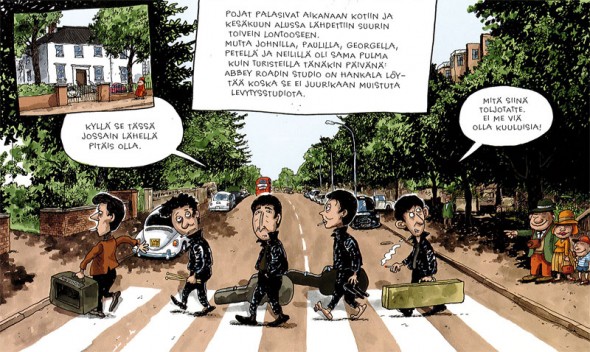
At last the boys came home from Germany, and in June 1962 they left for London with high hopes. But John, Paul, George, Pete and Neil had the same problems that tourists experience even today: The Abbey Road studio is hard to find because it doesn’t look like a recording studio. – It ought to be around here somewhere. – What are you staring at, we’re not famous yet!
In this 77-page graphic story the Beatles grow from babies into celebrities. The large number of hilarious visual details keeps the reader vigilant: for example, in their early days on Hamburg’s Reeperbahn John, Paul, George and Pete (Best) stay in lodgings behind a cinema that are less than hygienic, so on closer examination the lads turn out to be wearing underpants with yellow spots.
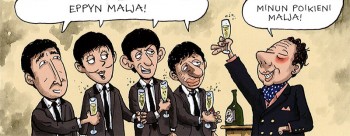
–To Eppy! –To my boys!
Julia Lennon, Klaus Voormann, Astrid Kirchherr, Stuart Sutcliffe, Cynthia, Brian Epstein, George Martin: the faces in the gallery of characters are instantly recognisable. Piitles illustrates how Beatlemania was born, and it is truly the work of a faithful fan.
An infinite number of days
31 March 1997 | Archives online, Fiction, poetry
Poems from Molnsommar (‘Cloud summer’, Schildts, 1996). Introduction by Tuva Korsström
Old man
He almost merely slept
and while he slept
his life was accomplished.
Pieces slid out
were examined and fitted together
and while he slept
he was made ready. More…
One night stand
31 March 1987 | Archives online, Fiction, Prose
Stories from Yhden yön pysäkki (‘One night stand’, 1985) and Unohdettu vartti (‘The forgotten quarter’, 1986). Introduction by Pekka Tarkka
At the beginning of November it really started to freeze. A month earlier than usual. There was little snow to speak of, but the ground froze hard as bone.
Tamed by hunger, reindeer clustered along the roadsides and on the village outskirts. Many of them ended their misery by flinging themselves under the timber-lorries in the evening dark. Bony and bloody carcasses littered the ditches and field-edges.
Then the snowstorms came. It snowed without stop for nearly two weeks. At times the whole landscape was reduced to a white line. Snowdrifts mounted round the houses and up the snow fences. The reindeer carcasses lay about under the snowbanks, waiting for spring. More…
The storm
From the collection of short stories Tvåsamhet (‘Two alone’, Söderströms, 2005). Introduction by Tiia Strandén
A storm blows up during the night. As he lies in bed, not yet asleep, just lingering on the brink of falling, in that soft yet sensitive state where sounds seem to grow and get bigger, he can hear the clattering, hissing sound of the wind coming up out there and sweeping up everything not fastened down, capable of being put in motion. It scrapes against the roof and window, loosens leaves and pine needles which scud across the ground, and it whistles and whines round the chimney and the windows, and it even beats against the shed door, which Dad must have forgotten to shut properly before he came in. Before he stamped the mud off his boots in the front hall. Before he had a chance to pull the front door shut firmly as well, because Joakim can hear how he brings the storm into the hall with him, and it sweeps through the kitchen faster than he ever could have imagined. Joakim shuts his eyes tighter, even though he is no longer really awake, and he hears the powerful gust flap past Dad, who is still standing with his hand on the door handle, and then Mum starts shouting because the wind is slamming into the furniture and making dishes crash to the floor and making pots and pans do the same. When Dad starts shouting as well, Joakim lets go of the last little bit of wakefulness and lets himself sink down into the cradle of dreams to be carried along until the morning. It is the sun that wakes him, or maybe the sound of the telephone, because he wakes up just as it rings, but in any case it has stopped blowing, and the branches of the big lilac bush outside the window are completely still. More…
Updated, alive
8 May 2014 | Non-fiction, Reviews
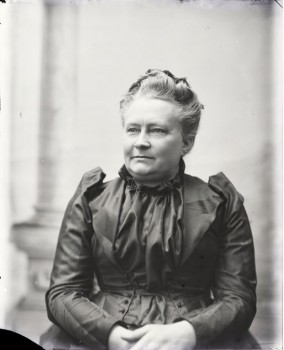
Minna at 50. The Finnish flag is flown on her birthday: 19 March has been named the Day of Equality. Canth also flies on the tail of one of the aircrafts of the Nordic airline Norwegian: the fleet carries portraits of ‘heroes’ and ‘heroines’ of four Nordic countries (the other Finn is the 19th-century poet J.L. Runeberg). Original photo: Viktor Barsokevich / Kuopio Museum of Cultural History
Herkkä, hellä, hehkuvainen – Minna Canth
[Sensitive, gentle, radiant – Minna Canth]
Helsinki: Otava, 2014. 429 pp., ill.
ISBN 978-951-1-23656-6
€40.20, hardback
There are two sure methods of preserving the freshness of the works of a classical author in a reading culture that is increasingly losing its vigour.
The first is to give a high profile to new interpretations of them, either in the form of scholarly lectures or of artistic re-workings, such as dramatisations, librettos or film scripts. Another unbeatable way to keep them alive as a subject of discussion is an updated biography, through which the author is seen with new eyes.
Minna Canth (1844–1897) is now celebrating her 170th anniversary, and she is fortunate in both respects. Having begun her literary career in the late nineteenth century, she still continues to be Finland’s most significant female writer.
Her influence on the role of women in society and, in particular, her promotion of girls’ education, is the cornerstone of Finland’s social equality. In the twenty-first century Canth’s plays are still receiving new interpretations, and they have also been made into operas and musicals. (Read her short story, ‘The nursemaid’, here.) More…
Can’t say it’s not spring
18 April 2013 | Fiction, Prose
Short prose from Mahdottomuuksien rajoissa. Matkakirja (‘In the realm of impossibility. A travel book’, Teos, 2013). Texts by Katri Tapola, illustrations by Virpi Talvitie. Interview by Anna-Leena Ekroos
The first try
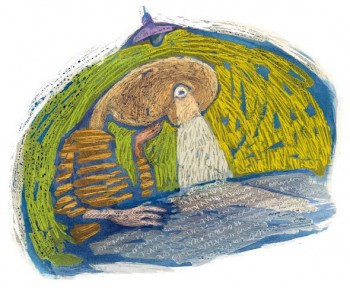
A reader doesn’t have to understand anything on the first try. You can always put a book aside and see if the second read will help. If the second, third, fourth, or even fifth read doesn’t help, that’s still all right. What is this constant compulsion to understand everything? There’s nothing wrong with not understanding – on the contrary, it is precisely the state of baffled befuddlement that hides the hope of light within it. I can’t understand any of this! I’m having fun! the reader happily exclaims, and goes on with his life, eyes overflowing with light. More…
Green gold, black gold
31 March 2001 | Archives online, Fiction, poetry
Poems from Jakutian aurinko (‘The Yakutian sun’; Tammi, 2000). Introduction by Kari Sallamaa
So this, then, is Tomsk,
a town, tumbling into snow.
Even its lanes rise up into the sky.
No longer fragrant the pine,
the juniper, not even the gardens.
Can’t trust the skirts,
above the rooftops,
stripes are beaten out of the carpet,
yellow and turquoise for the horizon,
under the rooftops, fingernails
rip the wallpaper,
those white frost fingernails.
So, this is Tomsk,
in its streets the Volgas zip by.
And when I get a ride, the back seat fills up in no time.
Breath steams, nylon rips. The ladies
apply lipstick, unconcerned. More…
On the waves of our skin
4 December 2009 | Fiction, poetry
The poems in Ilpo Tiihonen’s new collection, Jumalan sumu (‘God’s mist’) – about fakirs, beggars, poets, lovers and life – are tinged with a gentle sense of the ephemerality of human life (see Gatecrashing the universe)
Poems from Jumalan sumu (‘God’s mist’, WSOY, 2009)
SANTO PAN
These mornings when beggars
station themselves at church doors
and a little grace slips through
the fingers of some of us,
it seems for a moment good
That crows are flying about
and princes’ bones are clattering in huge sarcophagi
And now, with a basic shape planned
for the daily bread,
Early morning wakes up in Florence
with black flour in its fingernails More…
Life: facts and fiction
10 September 2014 | Extracts, Non-fiction
 In his latest book, the architect and author Arne Nevanlinna (born 1925) recalls, among other things, his Helsinki childhood and family, the wartime period, his fellow architect Alvar Aalto, various aspects of the spirit of the times, his own work and writings. His first novel Marie was published in 2008. Extracts from Arne. Oman elämän kintereillä (‘Arne. On the trail of one’s life’, Siltala, 2014)
In his latest book, the architect and author Arne Nevanlinna (born 1925) recalls, among other things, his Helsinki childhood and family, the wartime period, his fellow architect Alvar Aalto, various aspects of the spirit of the times, his own work and writings. His first novel Marie was published in 2008. Extracts from Arne. Oman elämän kintereillä (‘Arne. On the trail of one’s life’, Siltala, 2014)
My attitude to my own identity has developed from the unconsciousness of childhood, the uncertainty of early adulthood, the artificial arrogance of middle age and the self-analysis of approaching retirement, to my present situation.
Despite the fact that my first book had some degree of success, it took many books before I felt I was a real writer. The process continued for well over ten years, by which time I was already over eighty. Before that, I thought of writing as a way to pass the time and combat loneliness. I imagined that I was writing for a living, and that I lived in order to write. I was in the fortunate position of not to think about my income.
Even then, I knew that this was just a catchphrase for the event that it occurred to someone in the audience to ask me why I wrote. That never actually happened. No wonder, as both question and answer would have been unnecessary, to put it mildly, and stupid, to put it harshly. More…
The love of the Berber lion
30 December 2008 | Fiction, Prose
A short story from the novel Berberileijonan rakkaus ja muita tarinoita (‘The love of the Berber lion and other stories’, WSOY, 2008). Introduction by Janna Kantola
The lion’s name was Muthul. He was an old Berber lion from the Atlas Mountains. He had a black mane, a black tail with a bushy tip and the scars of many battles on his hide.
He had grown up as a lion cub in the royal palace at Carthage at the time when the Romans, led by Scipio the younger, destroyed the city with fire and sword. The palace was set ablaze, a bloody battle ensued in the gardens, Romans impaled on arrows lay strewn in the rose bushes, Carthaginian blood dyed the water in the fountains. Someone had let all the palace animals, wild and tame alike, out of their cages; they were running around wildly, killing each other in the grip of panic, then disappeared inexplicably. More…
The ring
31 December 1998 | Archives online, Fiction, Prose
A short story from Irti (‘Away’, Gummerus 1998). Introduction by Milla Autio
When the car turns into the drive I know that this time it has happened. That this time it has not been for nothing that I have felt cold fear creep inside my stomach. And for a moment, as Vangelis gets out of the car and looks at me and Irini sighs deeply and grabs me as if for support, I feel nothing.
The landscape is the same, the trees and the burnt grass and the intoxicating scents of late summer. And the sounds, too, are the same; the merry cries of children farther off and the clatter of dishes from the kitchen. Later, of course, my landscape will shudder and quake from its place, fly on its way like disturbed papers. That was something you shouted at me about; other such incidents I do not remember, but when a gust of air from the door caught your papers you went mad. That moment is inscribed in my memory, caught there like the words on the pages of a book. More…
